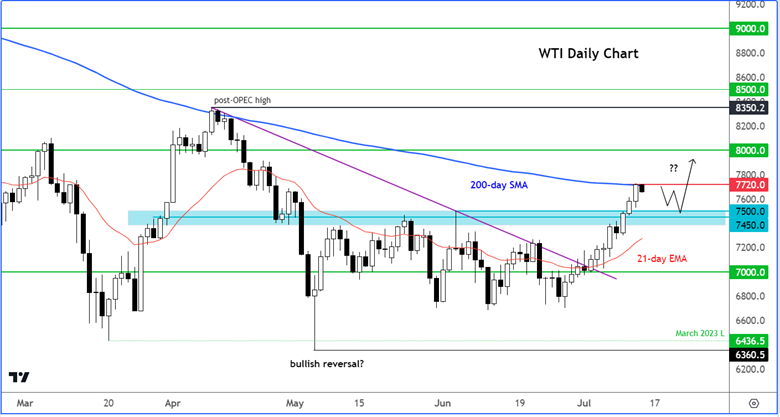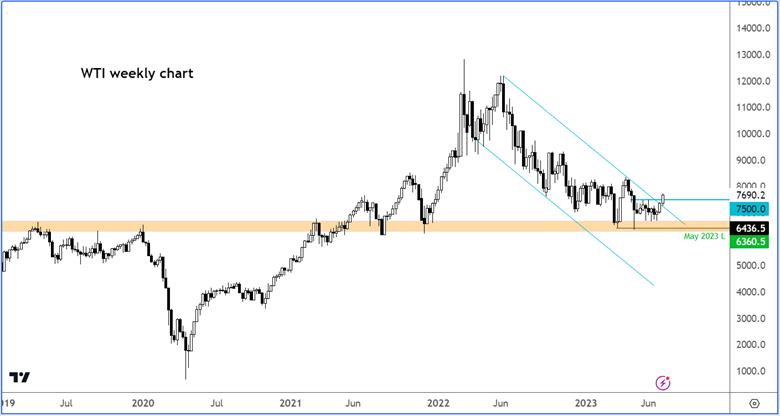Both oil contracts have now more than made up the 10% decline suffered in May. In June, oil prices rebounded a modest 4% before rising around 8% so far in July. The momentum is clearly to the upside, states Fawad Razaqzada of Trading Candles.
Oil prices have risen this week alongside other risk assets, with US stock indices repeatedly hitting new highs for the year. The narrative that the Federal Reserve is winning the fight against inflation got a boost as both CPI and PPI came in weaker than expected this week, leading to a fresh rally for stocks, oil, bonds, and foreign currencies. The fact that the Dollar Index fell below 100.00, has helped to boost the prices of all buck-denominated assets, including crude oil, gold, silver, and copper.
It looks like investor concerns about demand have also been reduced somewhat, despite the prospects of even higher interest rates in the US, UK, and Eurozone. That said, the market is confident that the peak has almost been reached and that inflationary pressures should begin to fall in Europe given the strength of the euro and especially the pound. A stronger exchange rate of course helps to offset import costs.
Cuts Point To Tight Market
Retail sales aside, the economic calendar is void of any major US data next week, which should allow the dollar to potentially make a small recovery after a bruising week. This may also prevent buck-denominated oil prices from rising significantly further. A bit of consolidation should be expected, although that’s not to say oil will not resume higher again. There will be lots of company earnings, though, that could drive market sentiment until central banks are in focus again the following week.
For oil, the most important event next week is likely to be the data dump from China on Monday. The world’s second-largest economy has not been doing very well lately, which explains why the Chinese stock markets and yuan have been among the weakest in their respective fields. We will find out exactly how China performed in Q2 after output had expanded by an above-forecast 4.5% in Q1 compared to the same period in 2022. We will also have the latest retail sales and industrial production figures released at the same time.
If we see signs that China is still struggling, then that could hurt oil prices a little as demand concerns come to the forefront. Otherwise, the weaker dollar story and expectations that the oil market will tighten further should keep a floor under prices.
OPEC+ Cuts Point To Tight Market
Indeed, the biggest factor supporting crude oil is no doubt the ongoing supply cuts from OPEC+ and voluntary cuts made by several members to help tighten the market, including Saudi. The cuts mean supply could tighten significantly as we head deeper in the second half of 2023 if members continue to comply.
Crude Oil Outlook: Technical Analysis
At these levels, there are not many obvious resistance levels to consider, with Brent having surpassed $80 and WTI taking out $75. So, any short-term weakness we observe may well be due to profit-taking on long positions than short selling. The next big level for Brent is around $82ish and $77ish for WTI—these levels mark the 200-day moving average.
WTI has tested this level today and reacted by falling a little:

Source: TradingView.com
It might not be a bad thing if prices now consolidate below the 200-day average for a few days, to regain some energy and then break higher. Key support is now seen at around $75.00 on WTI, the base of this week’s breakout. For as long as the price holds around that level, give or take $1, the bulls will remain happy.
Looking at the weekly chart, we can see that WTI has broken out of a long-term bear channel after holding a major support zone in the last couple of months around $65ish.

Source: TradingView.com
This is potentially a major technical development, suggesting that prices want to push higher again. From here, $80 could be the next target, but there’s no reason why oil prices cannot go even higher—for as long as the demand concerns do not resurface.
To learn more about Fawad Razaqzada visit TradingCandles.com.











